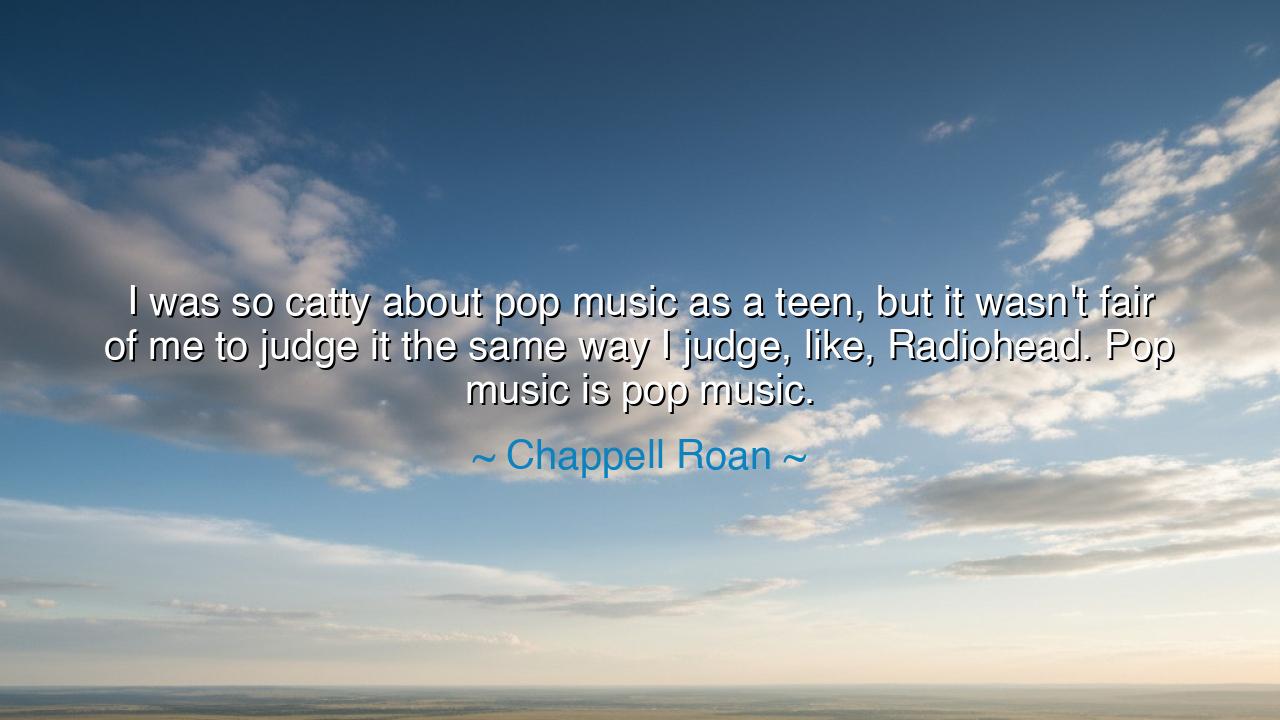
I was so catty about pop music as a teen, but it wasn't fair of
I was so catty about pop music as a teen, but it wasn't fair of me to judge it the same way I judge, like, Radiohead. Pop music is pop music.






When Chappell Roan, the rising voice of her generation, confessed, “I was so catty about pop music as a teen, but it wasn't fair of me to judge it the same way I judge, like, Radiohead. Pop music is pop music,” she spoke not merely of music, but of perspective, humility, and the folly of youthful arrogance. In these words lies a recognition of truth: that each form of art must be weighed by its own measure, not forced into the frame of another. The pop song is not diminished because it does not wear the robes of the avant-garde—it is complete in itself, carrying its own beauty, its own mission, its own magic.
The meaning of her words is a turning from judgment to understanding. In her youth, she looked down upon the glitter and ease of pop, comparing it to the depth and complexity of bands like Radiohead, whose layered music often demands patience and contemplation. But as she grew, she realized that this comparison was unjust, for pop music is not crafted to be Radiohead, nor should it be. It is born for joy, for dancing, for immediacy. Its strength is not in mystery but in clarity, not in intricacy but in impact. To scorn it for what it is not is to miss the gift of what it is.
History itself gives witness to this lesson. In ancient Greece, the lofty tragedies of Sophocles were revered as pinnacles of art, yet alongside them thrived the bawdy comedies of Aristophanes, beloved by the common people. Were the comedies lesser because they made the crowds laugh instead of weep? No—they fulfilled a different need, carried a different spirit, and in that way were equally necessary to the soul of the people. So too with pop music and the “serious” sounds of artistry: each speaks to a different hunger, each meets a different moment in the human heart.
The tale of the Beatles offers another mirror. At first, they were dismissed as mere pop idols, singers of simple love songs for screaming teenagers. Yet with time, the world came to see the genius woven even into those early tunes, and how their mastery of pop laid the foundation for the later depths of Sgt. Pepper’s and Abbey Road. To judge the first unfairly against the last would be blindness. One must see each work in its own light. Pop is pop, and in its purity, it holds a power that endures.
Roan’s words also carry humility—the recognition that youthful scorn often blinds us. It is easy, when young, to prove our sophistication by mocking what others love. But wisdom comes in seeing that every art form, every genre, has a purpose, a rhythm, a truth of its own. To dismiss pop is to dismiss the laughter of children, the energy of the dance floor, the joy of a chorus sung by a stadium of voices. True maturity is not in elevating one art over another, but in honoring each for what it is.
O seekers of wisdom, learn from this confession: do not bind all things to a single measure. Judge a tree not by whether it bears grapes, but by whether it bears the fruit it was meant to bear. Judge a song not by whether it speaks like Radiohead, but by whether it fulfills its calling as pop. To compare unlike things unfairly is to live in bitterness; to accept them in their difference is to live in peace.
Therefore, let Roan’s words echo in your heart: “Pop music is pop music.” In them is a teaching for more than art—it is a lesson for life. Do not scorn what is simple, joyful, or common. Recognize the worth of each creation, each voice, each style, in its own place. Practice discernment, yes, but temper it with compassion. In this way, you will not only become a deeper listener of music—you will become a wiser participant in the great harmony of the world.






AAdministratorAdministrator
Welcome, honored guests. Please leave a comment, we will respond soon